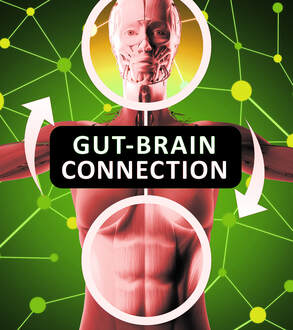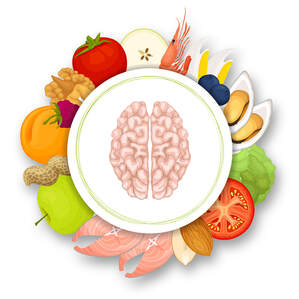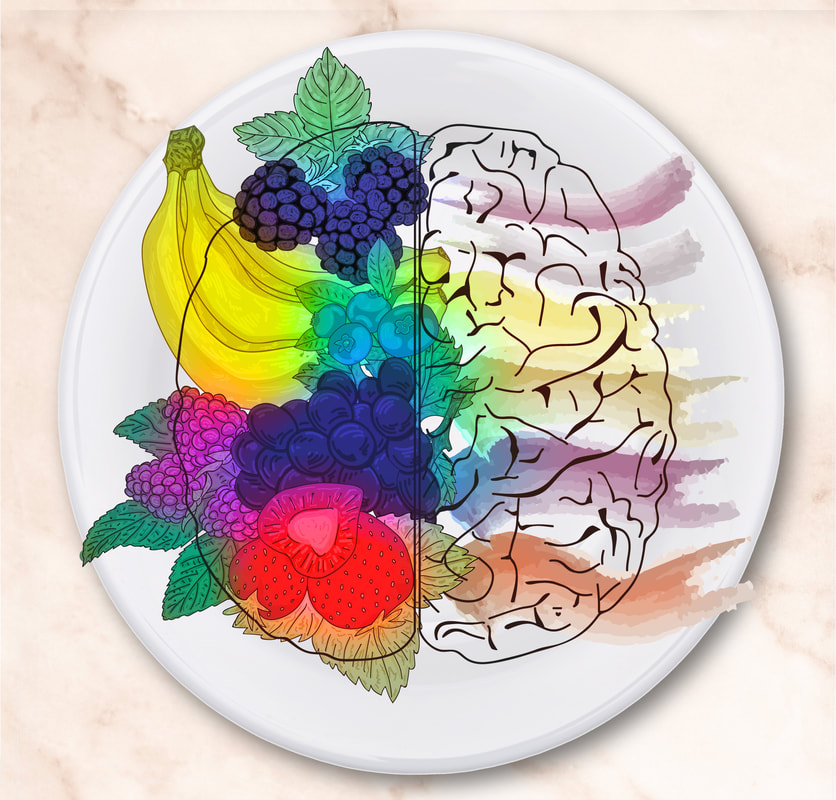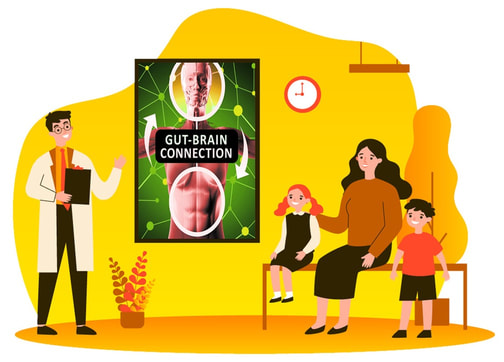|
In our recent PANS and PANDAS article, we touched on the issues of food and diet as a factor in these disorders, but wanted to explore a little further some of the research and recommendations for dietary programs that may be helpful to consider. The gut-brain connection (again!).  An interesting 2018 study (Quagliariello, A., Del Chierico, F., et al)1 examined the relationship between PANS/PANDAS and gut microbiota (GM) ecology. Certain aspects of this research touched on several points about which we’ve written in the past, including the value in maintaining a balanced gut environment. When the gut is highly inflamed from various mechanisms this can lead to a pro-inflammatory status and subsequent immune response activation. If the microbiome composition is altered, it also could have indirect effects by reducing the production of metabolites such as SCFA, d-alanine and tyrosine metabolism, and the dopamine pathway, which are involved in important brain functions. The investigators concluded “The results obtained from this study suggest that streptococcal infections can alter gut microbial communities leading to a pro-inflammatory state in the gut by selecting for specific bacterial strains that are normally associated with gut inflammation and activation of the immune response. This condition is likely maintained in patients, even after the infection itself has resolved. Moreover, an altered GM composition could have indirect effects by reducing the production of metabolites involved in important brain functions such as SCFA, d-alanine and tyrosine metabolism, and the dopamine pathway. Thus, the GM composition may possibly influence behavior, as clinically observed in PANS/PANDAS patients.1  Nutrition in brain health. Certain nutrients influence cognition by acting on molecular systems or cellular processes that are vital for maintaining cognitive function. And this is no different in cases of PANS or PANDAS. Research in psychoneuroimmunology and brain biochemistry has identified the possibility of communication pathways that show us there is an association between what we eat, our central nervous system and immune function that all can influence our psychological health.2 Simply put, when our nutritional biochemistry is imbalanced, our brain health is impacted. It stands to reason then that an effective therapeutic intervention in any brain disease is to optimize nutrition and gut health. This should be a critical piece of any protocol that unfortunately is many times overlooked or ignored. Yet observation alone of our own sense of wellness, or lack thereof, and that of our children’s, most certainly supports this relationship between diet and health. “We are what we eat” still holds true and there’s little doubt that food can be a valuable resource or a detriment, depending on what we choose to put on our plates and in our body. And when it comes to looking at a total integrative approach for PANS and PANDAS, nutrition should be a key element. So how can we make choices appropriate to individual health needs? We always recommend that every child with PANS and PANDAS first have a nutritional assessment that looks at their diet and the foods they eat food at home, school or in other settings. With this critical information, we then can make a plan based on more information and better understanding to what food or nutritional piece to tackle first.
A comprehensive professional nutrition assessment has many aspects including a complete medical history and:
While an important criteria in a patient nutritional assessment, laboratory tests alone are not enough for pediatric nutrition assessment. We typically first recommend an elimination approach starting with gluten and dairy, limiting sugar, and eating whole, “real” foods that are non-GMO. We know this can be especially challenging with children, particularly for our PANS and PANDAS patients who already may be struggling with eating restriction symptoms. A few nutritional resources. While we always advise working with your family pediatrician or specialist to ensure your child’s diet and any sudden reactions or allergies are closely monitored, there are a number of helpful resources to consider. For example, Robyn Obrien’s 80/20 rule provides what is usually an agreeable alternative based on her suggestion to aim for “progress not perfection.” Children do better when empowered to make healthy choices and it’s far more constructive to avoid judgment and language that makes the child (or the parent) feel like they’ve failed. Remember that there is no “one-size-fits-all” diet that works for everyone and even food plans that are too restrictive can be unhealthy too! Judy Converse is one of the nation's top pediatric nutrition experts, sharing insights on healing the gut, food and nutrition as well as explaining special diets such as gluten-free programs for conditions like attention deficient hyperactivity disorder (ADHD) and autism that may aid in alleviating symptoms. You can learn more at: https://www.nutritioncare.net/category/autism-adhd/page/2/ https://www.nutritioncare.net/gluten-free-diets-can-help-diminish-autism-features/ In her new book, Brain Food: The Surprising Science of Eating for Cognitive Power, Dr. Lisa Mosconi, PhD, INHC, Associate Director of the Alzheimer’s Prevention Clinic at Weill Cornell Medical College, highlights the connection between diet and brain function and shares valuable and very doable ideas for real life. She writes that "The research makes it clear: diet plays a clear and determinant role in every aspect of brain function, literally shaping our thoughts, actions, emotions, and behaviors...if your job depends on your brain, it depends on your diet." This news segment featuring a discussion with Dr. Mosconi really brought into sharp focus, both literally and figuratively, the results of poor eating habits, e.g the standard American diet, vs. adhering to the tenets of things like the Mediterranean diet and about which we’ve also written extensively in several of our other blogs (we’ve included links to several of these at the end of this article). And what about a way to get your kids into the kitchen and out of the junk food aisle?! This is a wonderful book to engage children early on in the all the benefits of learning to cook food that they’ll likely be far more motivated to eat as well. Check out Chef Junior: 100 Super Delicious Recipes by Kids for Kids! It’s available as a hardcover or e-book that we highly recommend for inspiring a healthy connection to food for any child (great gift idea too). Parents often cite getting their children to eat well is an ongoing struggle – and for those families dealing with PANS or PANDAS, these situations are fraught with even more difficulties that can provoke other hallmark issues of the disorders (digestive problems, opposition, tantrums etc.). That’s why we can’t emphasize enough to work with your doctor and ideally a trained nutritionist to get the help both you and your child need. And if we can answer any questions or provide any assistance, please don’t hesitate to reach out to our clinics today. In health and hope, Dr. Suzanne Gazda References and additional reading 1 Quagliariello, A., Del Chierico, F., Russo, A., Reddel, S., Conte, G., Lopetuso, L. R., Ianiro, G., Dallapiccola, B., Cardona, F., Gasbarrini, A., & Putignani, L. (2018). Gut Microbiota Profiling and Gut-Brain Crosstalk in Children Affected by Pediatric Acute-Onset Neuropsychiatric Syndrome and Pediatric Autoimmune Neuropsychiatric Disorders Associated With Streptococcal Infections. Frontiers in microbiology, 9, 675. https://doi.org/10.3389/fmicb.2018.00675 https://www.ncbi.nlm.nih.gov/pmc/articles/PMC5900790/ 2 Rao, T. S., Asha, M. R., Ramesh, B. N., & Rao, K. S. (2008). Understanding nutrition, depression and mental illnesses. Indian journal of psychiatry, 50(2), 77–82. https://doi.org/10.4103/0019-5545.42391 Other related blogs: https://www.suzannegazdamd.com/blog/does-all-disease-begin-in-the-gut https://www.suzannegazdamd.com/blog/olive-oil-the-heart-of-the-mediterranean-diet-thats-good-for-your-brain-too https://www.suzannegazdamd.com/blog/the-healing-power-of-food https://www.suzannegazdamd.com/blog/what-have-we-learned-since-rain-man-brought-autism-into-the-public-spotlight https://www.suzannegazdamd.com/blog/the-healing-power-of-food
0 Comments
Your comment will be posted after it is approved.
Leave a Reply. |
AuthorDr. Suzanne Gazda, Integrative Neurology Archives
February 2024
Categories |


 RSS Feed
RSS Feed